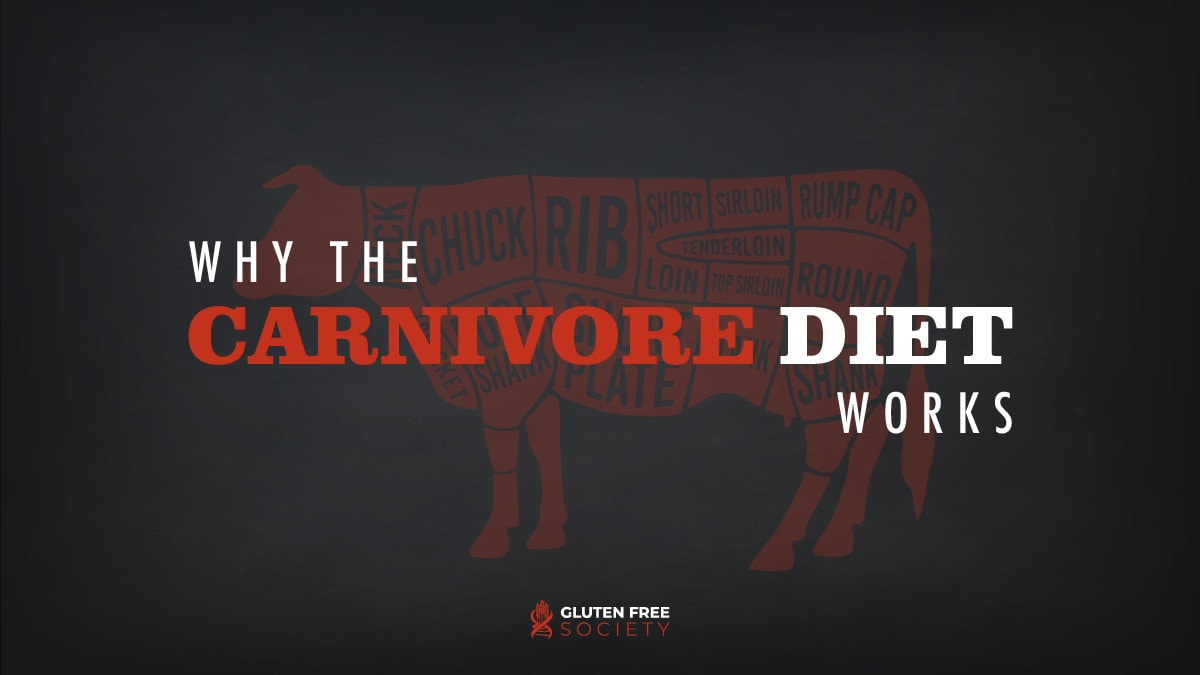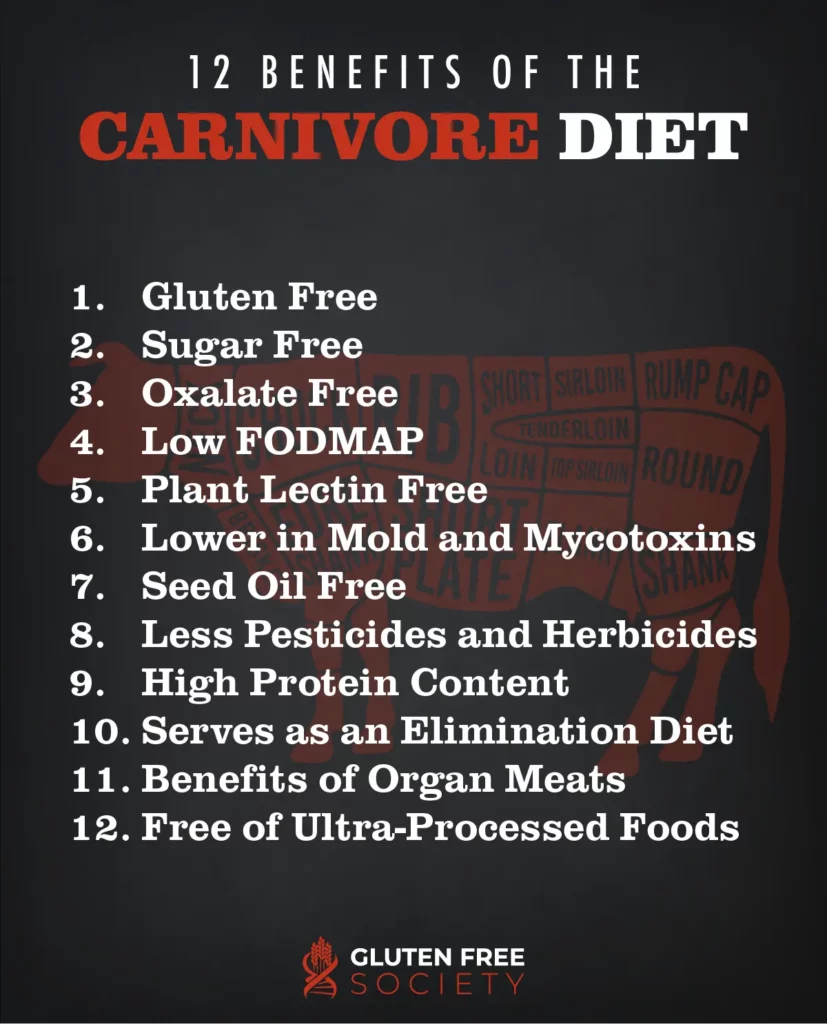new to the gluten free journey?
new to the gluten free journey?

The carnivore diet benefits those with celiac and non celiac gluten sensitivity (NCGS) in part because it is inherently a gluten free diet. Though the diet is very restrictive, and not necessary for all with celiac and NCGS, it may play a critical role in recovery for those who have gone gluten free yet continue to struggle. If you fall into this category, you will want to continue reading.
Contents
ToggleThe carnivore diet, consisting entirely of animal products, is gaining attention for its potential benefits, particularly for individuals with celiac disease, gluten sensitivity, or challenging autoimmune conditions. Consisting entirely of animal based foods like dairy, eggs, and meats, this diet is inherently free of gluten, sugar, oxalates, and other compounds that can be problematic for those struggling with chronic inflammatory conditions.
The growing interest in carnivore diets contrasts with traditional health advice promoting heavy plant based food consumption. The diet has been largely popularized by high profile influencers like Joe Rogan, Dr. Shawn Baker, Dr. Ken Berry, as well as Dr. Jordan Peterson and his daughter Mikhaila.
Though research is currently limited, the large body of anecdotal evidence in favor of the diet should not be overlooked. Online support groups for the diet show thousands of adherents reporting tremendous benefits.
Research based historical evidence on animal based diets from Arctic and nomadic societies show good health outcomes. Additionally, there are published reports on using low carb, meat/fat based diets to treat diabetes before the discovery of insulin.
Harvard researchers have recently turned their attention to the Carnivore Diet. A recent study on 2,029 patients found the following benefits of those following the diet:
Based on several decades of clinical experience dealing directly with chronic autoimmune patients, I am of the opinion that many who benefit from a carnivore diet fall into several categories:
Going carnivore eliminates many of the above categories. In essence, a carnivore diet is a compilation of many of the best restrictive healing diets. Often those who benefit most from this diet have tried many of the diet changes above, but haven’t tried them all at the same time.
Additionally, research suggests that those living in cities and urban areas may have altered microbiomes less capable of breaking down plant based fibers and polysaccharides. In that light, it is possible that those who feel best on a carnivore diet may lack the microbes necessary to break down a diet rich in plant fibers and carbohydrates.

The carnivore diet completely excludes gluten, a protein found in wheat, barley, rye, oats, and other grains, which are harmful to individuals with celiac disease or gluten sensitivity. By consuming only animal products, people with these conditions can avoid gluten exposure, reducing the risk of inflammation, intestinal damage, and autoimmune diseases.
Many seeking the carnivore diet have a history of excessive sugar and carbohydrate consumption. The absence of sugars in the carnivore diet helps in preventing blood sugar spikes and managing insulin sensitivity. This can be particularly beneficial for individuals with metabolic disorders or diabetes, as it promotes stable energy levels and reduces cravings for sweet foods. Although direct studies on the sugar-free aspect of the carnivore diet are limited, the known effects of sugar on blood glucose and insulin levels support this benefit.
Oxalates in plant foods can contribute to autoimmune inflammation, arthritis, vulvodynia, kidney stone formation, and other health issues. The carnivore diet eliminates the risk of oxalate overload, which can be especially important for those with oxalate sensitivity. Oxalates can also be produced internally by different species of yeast. The sugar free aspect of this diet may also restrict carbohydrate feeding of yeast, thus potentially reducing their oxalate production.
A low FODMAP diet is often recommended for individuals with irritable bowel syndrome (IBS) or digestive distress. Since the carnivore diet excludes high FODMAP foods like legumes, grains, and certain vegetables, it can alleviate gastrointestinal symptoms such as bloating, gas, and abdominal pain.
Plant based lectins, present in legumes and grains, can interfere with nutrient absorption and irritate the gut lining. The carnivore diet, being lectin-free, may reduce digestive discomfort and improve nutrient uptake, potentially benefiting those with lectin sensitivity or gut health issues.
As stated above, many who benefit from carnivore eating have environmental mold exposure. Mold and mycotoxins in contaminated plant foods can also cause health problems. The combination of environmental plus food sources can contribute to a “perfect storm” of immune dysfunction. Foods that contain higher levels of molds and mycotoxins are grains and alcoholic beverages. The carnivore diet minimizes exposure to both, offering a cleaner eating approach and potentially reducing health risks associated with mold and mycotoxin exposure.
Seed oils, often high in omega-6 fatty acids, can contribute to an imbalance in the omega-6 to omega-3 ratio, leading to inflammation and increased risk of coronary heart disease. The carnivore diet excludes these oils, favoring animal fats that have a more balanced fatty acid profile, which may support anti-inflammatory processes.
Conventional plant agriculture often uses pesticides and herbicides that can remain as residues in plant foods. By consuming grass-fed and free-range meats, individuals on the carnivore diet may reduce their exposure to chemicals like glyphosate, potentially lowering their toxin burden.
Having done lab testing of thousands of patients, protein and amino acid deficiencies are common in those with chronic inflammatory diseases. Protein is crucial for tissue repair and immune function. The carnivore diet provides high levels of bioavailable protein, essential for muscle maintenance, hormonal balance, and healing processes, especially important for individuals recovering from chronic inflammation or illness.
Having done lab testing on thousands of patients, food multiple food and food additive sensitivities are common in the chronically inflamed. The carnivore diet can serve as an elimination diet, helping to identify food intolerances. By removing potential dietary triggers, individuals can better track, possibly re-introduce foods, and better manage their symptoms, leading to improved health outcomes.
Incorporating organ meats into the carnivore diet provides essential nutrients like vitamins A, D, E, and K, B-vitamins, minerals, and amino acids, reducing the risk of nutritional deficiencies often associated with restrictive diets.
The carnivore diet emphasizes whole, unprocessed meats, and eliminates ultra-processed foods, which researchers have linked to chronic diseases, obesity, and poor health outcomes. This shift can contribute to better overall health and well-being.

While the anecdotal benefits of the diet should not be overlooked, there is a lack of research for those who follow this diet long term. Critics of the diet most notably point out that the diet may be too low in vitamin C, potassium, or other nutrients. A rebuttal of that critique been published in the journal, Current Opinion in Endocrinology, Diabetes, & Obesity.
Another study analyzed the nutrient content of carnivore diet meal plans and found the following:
it fell short in thiamin, magnesium, calcium, and Vitamin C, and in iron, folate, iodine and potassium in some cases. Fibre intake was significantly below recommended levels. Conclusion: The carnivore diet may offer benefits for managing certain chronic conditions. Whether the metabolic contexts from consuming such a diet facilitates a lower requirement of certain nutrients, or whether it poses risks of micronutrient inadequacies remains to be determined. Tailored nutritional guidance and supplementation strategies are recommended to ensure careful consideration of micronutrient intake to prevent deficiencies.
Others argue that high meat consumption may increase the risk of heart disease and cancer. Though no causal link has ever been substantiated directly in research. That being said, it is still prudent to recognize that any long term restriction diet may come with risks.
My own clinical experience when treating people following a long term (1 year or longer) carnivore diet is mixed. In some cases, I have seen the diet result in tremendous health improvements while also maintaining good nutritional status. In other cases, I have seen the diet restriction lead to major digestive problems and severe malnutrition as assessed through clinical laboratory testing.
Fundamentally, there is no such thing as a one size fits all diet. The carnivore diet benefits many, but it is not a cure all, and there are long term concerns for anyone following a highly restricted diet. If you find yourself feeling tremendously better on this diet, listen to your body. If your doctor tries to scare you away from the diet despite how it helps you, find another doctor.
If you are following the diet long term, it is ideal that you work with a doctor who has a deep knowledge of nutrition to help you navigate any potential pitfalls.
For individuals with celiac, gluten sensitivity, or autoimmune disease, the carnivore diet might offer a pathway to reducing inflammation and digestive distress. However, it’s crucial to approach this diet with careful planning and medical guidance to ensure nutritional balance and monitor health outcomes.
Have you been on a carnivore diet? Please share your experience with it below.
Yes, the carnivore diet is inherently gluten-free, making it safe for individuals with celiac disease. However, proper nutritional guidance is essential to avoid long-term deficiencies.
Yes. Some individuals with NCGS or celiac continue to experience symptoms due to other food sensitivities, dysbiosis, mold exposure, or oxalate overload. The carnivore diet removes many of these triggers at once.
Organ meats are highly recommended for nutrient density. They provide essential vitamins and minerals that are harder to get from muscle meat alone, including B12, vitamin A, and iron.
The carnivore diet contains little to no fiber. However, some research and clinical experience suggest that fiber is not essential for gut health in all individuals, especially those with dysbiosis or IBS.
Some people thrive long-term, while others may experience deficiencies. It’s best to monitor lab markers and work with a knowledgeable healthcare provider if staying on the diet for more than 3–6 months.
Yes. Some adopt a “carnivore-ish” or “animal-based” approach that includes low-toxin plant foods like berries, squash, or fermented vegetables. This may offer more flexibility while retaining many benefits.
By removing potential dietary triggers and reducing gut permeability, many people with autoimmune conditions report symptom improvement on the carnivore diet. Individual results vary.
Stay up-to-date with the latest articles, tips, recipes and more.

*These statements have not been evaluated by the Food and Drug Administration. This product is not intended to diagnose, treat, cure or prevent any disease.
If you are pregnant, nursing, taking medication, or have a medical condition, consult your physician before using this product.
The entire contents of this website are based upon the opinions of Peter Osborne, unless otherwise noted. Individual articles are based upon the opinions of the respective author, who retains copyright as marked. The information on this website is not intended to replace a one-on-one relationship with a qualified health care professional and is not intended as medical advice. It is intended as a sharing of knowledge and information from the research and experience of Peter Osborne and his community. Peter Osborne encourages you to make your own health care decisions based upon your research and in partnership with a qualified health care professional.
2 Responses
I started the carnivore diet April 2023 and it was finally the turning point I needed! I eat pretty healthy(so I thought) and keep active, I am gluten sensitive and have a tremendous amount of food sensitivities, hormonal issues and low iron and magnesium and probably malabsorption of many other vitamins and nutrients. Previously eating vegan, my hair fell out , low energy, couldn’t go uphill with ease anymore. Carnivore was the only thing that worked after turning 51. Shed some pounds, hair is growing, and increased energy. Still sensitive to dairy, I can’t eat any aged meat or cheeses or store bought dairy. I can only consume raw dairy, raw kefir and eggs from my friend’s chickens. If I try even the most expensive organic free range eggs in the store I will have an asthma attack, not sure what they do to them in processing them for the store, but I must stay far away! I am almost at my ideal weight and health goal. I will continue with an animal based diet. And, continue learning from Dr. Osborne and other great Dr’s (Dr.Berry, Dr. Gundry, Dr. Salidino, Dr Chaffee, to name a few) I am grateful for all the free YouTube videos, because allopathic Dr’s/nurse practitioners don’t understand how important nutrition is for optimal health! They just want to prescribe drugs that don’t work and cause so many other problems. I haven’t taken a prescription drug in years, I’d rather use food, vitamins and minerals. Thank you to all the Dr’s teaching us about nutrition and how different foods can help and harm you and you must listen to your unique body.
I watched your video on carnivore today. What is a Type A blood supposed to eat?